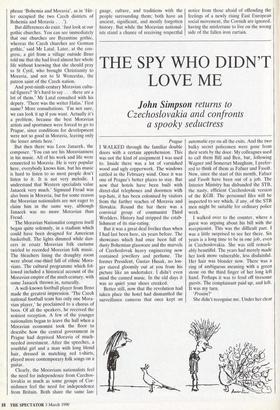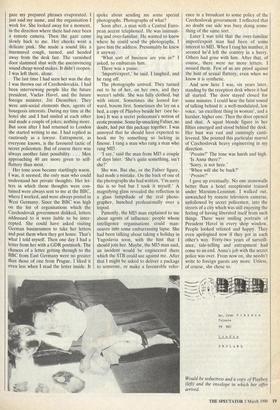THE SPY WHO DIDN'T LOVE ME
John Simpson returns to
Czechoslovakia and confronts a spooky seductress
Prague I WALKED through the familiar double doors with a certain apprehension. This was not the kind of assignment I was used to. Inside there was a lot of varnished wood and ugly copperwork. The windows rattled in the February wind. Once it was one of Prague's better places to stay. But now that hotels have been built with direct-dial telephones and doormen with top-hats, it has been colonised by visitors from the farther reaches of Moravia and Slovakia. Round the bar there was a convivial group of communist Third Worlders. History had stripped the estab- lishment of its star-rating.
But it was a great deal livelier than when I had last been here, six years before. The showcases which had once been full of dusty Bohemian glassware and the marvels of Czechoslovak heavy engineering now contained jewellery and perfume. The former President, Gustav Husak, no lon- ger stared gloomily out at you from his picture like an undertaker. I didn't even mind the canned music. In the old days it was so quiet your shoes creaked.
Better still, now that the revolution had taken place the hotel had dismantled the surveillance cameras that once kept an automatic eye on all the exits. And the two bulky secret policemen were gone from their seats by the door. My colleagues used to call them Bill and Ben, but, following Wagner and Somerset Maugham, I prefer- red to think of them as Fafner and FasoIt. Now, since the start of this month, Fafner and Fasolt have been out of a job. The Interior Ministry has disbanded the STB, the nasty, efficient Czechoslovak version of the KGB. The personnel files will be inspected to see which, if any, of the STB men might be suitable for ordinary police work.
I walked over to the counter, where a guest was arguing about his bill with the receptionist. This was the difficult part. I was a little surprised to see her there. Six years is a long time to be in one job, even in Czechoslovakia. She was still remark- ably beautiful. The years had merely made her look more vulnerable, less disdainful. Her hair was blonder now. There was a ring of ambiguous meaning with a green stone on the third finger of her long left hand. Perhaps it was to fend off tiresome guests. The complainant paid up, and left. It was my turn.
`Prosim?'
She didn't recognise me. Under her clear gaze my prepared phrases evaporated. I just said my name, and the organisation I work for. She looked away for a moment, in the direction where there had once been a remote camera. Then the gaze came slowly back to me. Her cheeks went a delicate pink. She made a sound like a murmured cough, turned, and headed away from the desk fast. The varnished door slammed shut with the unconvincing sound cheap wood makes. It didn't reopen. I was left there, alone.
The last time I had seen her was the day I was thrown out of Czechoslovakia. I had been interviewing people like the future president, Vaclav Havel, and the future foreign minister, Jiri Dienstbier. They were anti-social elements then, agents of bourgeois interests. During my time at the hotel she and I had smiled at each other and made a couple of jokes; nothing more. But soon after I had returned to London she started writing to me. I had replied as cautiously as a lawyer. Entrapment, as everyone knows, is the favoured tactic of secret policemen. But of course there was always another faint possibility. . . . Men approaching 40 are more given to self- flattery than most.
Her tone soon became startlingly warm. I was, it seemed, the only man who could understand her private thoughts. Her let- ters in which those thoughts were con- tained were always sent to me at the BBC, Where I worked, and were always posted in West Germany, Since the BBC was high on the list of organisations which the Czechoslovak government disliked, letters addressed to it were liable to be inter- cepted. She could have asked visiting German businessmen to take her letters and post them when they got home. That's what I told myself. Then one day I had a letter from her with a GDR postmark. The chances of a letter getting through to the BBC from East Germany were no greater than those of one from Prague. I liked it even less when I read the letter inside. It
spoke about sending me some special photographs. Photographs of what?
Soon after, a man with a Central Euro- pean accent telephoned. He was insinuat- ing and over-familiar. He wanted to know where he could send the photographs. I gave him the address. Presumably he knew it anyway.
'What sort of business are you in?' I asked, to embarrass him.
There was a pause.
'Import/export,' he said. I laughed, and he rang off.
The photographs arrived, They turned out to be of her, on her own, and they weren't subtle. She was fully clothed, but with intent. Sometimes she leaned for- ward, bosom first. Sometimes she lay on a bed, a copy of Playboy beside her (see be- low). It was a secret policeman's notion of erotic promise. Some lip-smacicing Fafner, no doubt, had put this package together. I was annoyed that he should have expected to hook me by something so lacking in finesse. I rang a man who rang a man who rang MI5.
'I say,' said the man from MI5 a couple of days later; 'She's quite something, isn't she?'
She was. But she, or the Fafner figure, had made a mistake. On the back of one of the photographs she had written, 'I'm sorry this is so bad but I took it myself.' A magnifying glass revealed the reflection in a glass lampshade of the real photo- grapher, hunched professionally over a tripod.
Patiently, the MIS man explained to me about agents of influence: people whom intelligence organisations could man- oeuvre into some embarrassing lapse. She had been talking about taking a holiday in Yugoslavia soon, with the hint that I should join her. Maybe, the MI5 man said, an incident would be engineered there which the STB could use against me. After that I might be asked to deliver a package to someone, or make a favourable refer-
ence in a broadcast to some policy of the Czechoslovak government. I reflected that no doubt our side was busy doing some- thing of the same sort.
Later I was told that the over-familiar import/export man had been of some interest to MI5. When I rang his number, it seemed he'd left the country in a hurry. Others had gone with him. After that, of course, there were no more letters. I missed them. Few of us are proof against the hint of sexual flattery, even when we know it is synthetic.
And now here I was, six years later, standing by the reception desk where it had all started. The door stayed closed for some minutes. I could hear the faint sound of talking behind it: a well-modulated, low voice, 'an excellent thing in woman', and a harsher, higher one. Then the door opened and shut. A squat blonde figure in her fifties emerged and stood behind the desk. Her bust was vast and cunningly canti- levered. She pointed this particular marvel of Czechoslovak heavy engineering in my direction.
`Prosim?' The tone was harsh and high. 'Is Anna there?'
'Sorry, is not here.'
'When will she be back?'
Prosim?'
I gave up eventually. No one stonewalls better than a hotel receptionist trained under Marxism-Leninism. I walked out, unwatched by remote television cameras, unfollowed by secret policemen, into the streets of a city which was still enjoying the feeling of having liberated itself from such things. There were smiling portraits of President Havel in every shop window. People looked relaxed and happy. They even apologised now if they got in each other's way. Forty-two years of surveill- ance, tale-telling and entrapment had come to an end. Anna's job with the secret police was over. From now on, she needn't write to foreign guests any more. Unless, of course, she chose to.



























































 Previous page
Previous page